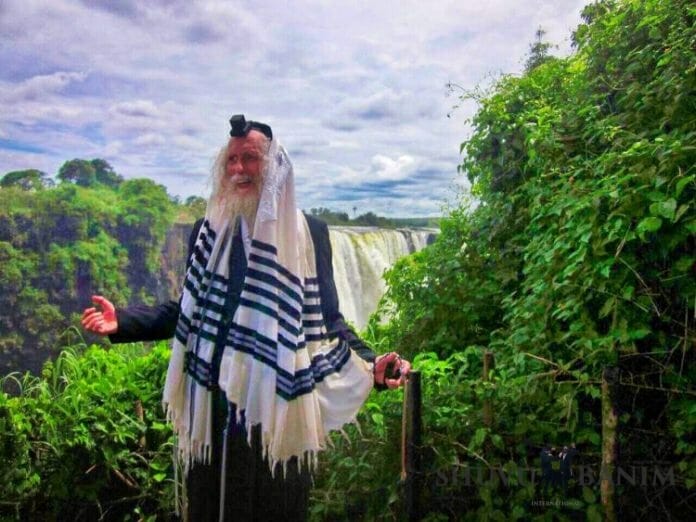South Africa’s winter rains haven’t fallen since 2015, making it the worst drought on record
On April 10, 2014, the government of Zimbabwe collaborated with Rav Eliezer Berland’s persecutors back in Israel to have the Rav publicly arrested, dressed in prisoner’s garb, handcuffed and with his head uncovered, while journalists were invited to take pictures.
Very soon after that, the rain in Zimbabwe stopped.
By the beginning of 2016, the New York Times was calling the El Nino drought in Zimbabwe “the worst drought in more than a generation.” As the rain dried up, so too did the crops and the exports which supported the entire Zimbabwean economy. The U.N. World Food Program announced that 1.5 million Zimbabweans needed urgent food aid, as a result of the famine.
Zimbabwe makes teshuva
Shortly after this on the 28th of January, 2016, the niece of Zimbabwe President Robert Mugabe traveled to South Africa to meet Rav Berland and ask his forgiveness, in the name of her uncle and all the Zimbabwean people.
In Shamayim, that apology had an instant effect: strong rains returned to the country, after two years of debilitating drought. According to the Commercial Farmers Union of Zimbabwe’s website:
“The country experienced good rains during the 2016/17 rainfall season, putting the country on course to revive its once vibrant agricultural economy.”
In the meantime, Rav Berland moved across the border from Zimbabwe to South Africa in April 2014; was arrested in Holland by Dutch authorities acting on a tip-off from Israel in September 2014, and returned to South Africa a second time sometime in July 2015 – three years’ ago.
South Africa’s cruel treatment of Rav Berland
From the moment the Rav stepped foot on South African soil, he was mercilessly chased by the South African ‘HAWKS’, a special division of the South African police force who’d been hired privately by the Rav’s persecutors to track him down and put an end to his public activities.
For months, the HAWKS hounded the Rav and intimidated his followers in South Africa, until April 7, 2016, when Rav Berland was arrested at a local hospital, enroute to turning himself in to the South African authorities before returning to Israel.
But the Rav’s terrible ordeal at the hands of the South Africans didn’t end there. He spent Pesach in the infamous, maximum security ‘Sun City’ prison in a tiny, unheated cell with some of the most violent, deranged people in the world, while the South African authorities refused to enable the Rav to receive any properly kosher for Passover food.
Only when Rav Grossman flew out to personally intervene was the Rav permitted to receive food parcels for Pesach that had been prepared by his wife, the Rabbanit Tehillah.
The Rav’s life was in danger on a number of occasions during his stay in South Africa, and it’s only b’chasdei Hashem that he and the members of his community returned to Israel unscathed.
Midda K’neged Midda
This month, South Africa’s residents were put on notice that their country is officially experiencing the worse drought on record.
According to current government predictions, Cape Town, the country’s second biggest city after Johannesburg, it set to run out of water completely by June 1, 2018, when the running water will be cut off to all homes, and most businesses in Cape Town.
According to a report on the VOX website:
“The story of how Cape Town went dry is remarkable, because up until a few years ago the city was help up as an example of a place with particularly sophisticated water conservation policies… in 2015 – just three years ago – Cape Town won a prestigious award for its water conservation policies.
“But 2015 also marked the beginning of a devastating three-year drought, unlike anything the city had seen in more than a century.”
While the water shortages in Cape Town are particularly acute, Durban and Johannesburg are also currently operating under tight water restrictions.
A separate report explained how South Africa’s once regular winter rains simply stopped falling over the last three years “a phenomenon one meteorologist calls a once-in 628-years weather event.”
Perhaps, the South African government should take a leaf out of Robert Mugabe’s book, and send a delegation to Israel, to apologize to Rav Eliezer Berland, shlita, for their awful, inhumane treatment of him.
Sincere teshuva worked to get the rains back to Zimbabwe, and with G-d’s help, it’ll work for South Africa, too.


















If HKB”H did so to Zimbabwe and is now doing the same thing to South Africa because of all injustice perpetrated there against Rav Berland shlita, Oy Lanu!! (I mean, the State of Israel) for the cruel treatment given to him by the judicial system, police and other government entities! Should the fraction of Israel’s population who supports Rav Berland suffer the consequences of Divine retribution against the few evil ones who set him up and gave false witness against him?
Apparently according to the author of this post, the answer is: Yes. innocent people can be be punished for the crimes of others.
Of course the Torah says explicitly the opposite:
לֹא יוּמְתוּ אָבוֹת עַל בָּנִים וּבָנִים לֹא יוּמְתוּ עַל אָבוֹת אִישׁ בְּחֶטְאוֹ יוּמָתוּ
(דברים פרק כד, פסוק טז)
Meaning that HKB”H punishes the guilty only. There is no divine collective punishment in the Torah.
To believe otherwise, is direct contradiction of the Torah.
If you know your Tanach, you’ll know that Eliyahu HaNavi decreed a drought on the whole of the 10 Tribes of Israel because of the wicked behavior of King Ahab. Hashem doesn’t ‘punish’, but He does use difficult circumstances to draw our attention to matters that require introspection and teshuva.
I don’t see much of a difference between a punishment and what you describe as “difficult circumstances to draw our attention to matters that require introspection”. These are just different words to describe the same thing: A penalty as retribution for an offense.
With regard to Eliyahu HaNavi and the drought. As both the Malbim and the Metzuda explain there, Eliyahu HaNavi was reprimanded for this cruelty by being forced into hiding and depending on wild ravens to provide for this food and water.
The symbolism being that much like like ravens that -are described as cruel and selfish- went against their nature to, Eliyahu HaNavi was supposed to have רחמנות on כלל ישראל
מצודת דוד שם: ללמד את אליהו שלא יתאכזר על ישראל, כשיראה שהעורבים האכזריים מרחמים עליו- ומכלכלים אותו- ואז גם הוא צריך לרחם על ישראל
מלבי”ם שם: הזמין פרנסתו על ידי עורבים שהם אכזרים בטבעם, למען יזכור כי כן התאכזר על העם להמיתם ברעב
Ultimately, Hashem is the one who is controlling everything in nature and the whole world. Are you saying that Hashem is ‘cruel and selfish’ whenever there is a drought, and that He’s engaging in ‘collective punishment’ of innocent people, G-d forbid?
Chazal teach us that there is no difficulty a person endures without a prior transgression.
Whatever occurs, whatever happens, it’s all from Hashem, it’s all ultimately for a person’s good, and it all contains a message about what that person needs to atone for, make teshuva about, change or improve.
These are the fundamentals of emuna, of Jewish faith.
So Hashem doesn’t ‘punish’ in a cruel and wanton way, G-d forbid. Hashem sends us difficult circumstances to encourage us to introspect and to figure out what changes or improvements Hashem wants from us.
This is a fundamental concept in our faith. All of us have work to do down here, and things we need to acknowledge about ourselves and behaviors and attitudes we need to try and improve.
…. but then can you please explain. So, if the respected Rabbis (and I mean that sincerely) took punishment upon himself for harsh decrees that were stored up against the secular, non religious state of Israel (which, as you know, does NOT have the support of the majority of religious Jews), then at what stage is the punishment overly much? (as in Pharaoh being punished for his over harsh treatment of Am Yisroel) since one might think the more harsh, the more Tshivah, the better. Just a theological question. Heaven forbid that the good pios Rabbi (or anyone for that matter) should ever have to be punished at the hands of anyone. It seems to me that the Isrrali police are not exactly a friendly bunch either by the way they push, shove and kick Hareidim in the streets, either. Just asking?